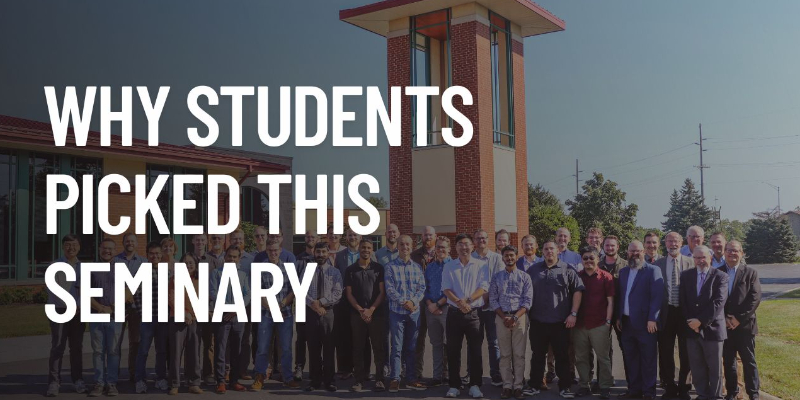
How Beautiful are the Feet of Those Who Preach Good News
“But how are they to call on him in whom they have not believed? And how are they to believe in him of whom they have never heard? And how are to hear without someone preaching? And how are they to preach unless they are sent? As it is written, ‘How beautiful are the feet of those who preach the good news!’” Romans 10:14-15
The words of this passage have always had a special place in Mid-America’s history. When you approach the Seminary’s main entrance, you will notice a cornerstone with the words, “How shall they hear … unless someone preach.” From its inception, Mid-America Reformed Seminary has sought to equip its students to go out into the Lord’s harvest field in order to herald the good news that there is salvation for all those who believe in Christ.
What is remarkable about Romans 10 is that it presents what J.R.W. Stott calls the apostle Paul’s “evangelistic manifesto.” When we, as Reformed Christians, read Romans 9-11, we think of it as a deep theological treatment of the doctrine of election—which it is. But we often miss the evangelistic heartbeat of the apostle Paul’s handling of God’s purpose of election in these chapters. Though Romans 10 has often been a battleground for interpretive debates about the apostle Paul’s teaching, three features stand out in the apostle’s evangelistic manifesto.
First, Paul poignantly reveals the motive that drives him as an apostle. The language that Paul uses at the beginning of Romans 10 is reminiscent of the way he began chapter 9. Even though he has argued throughout chapter 9 that the unbelief of many of his kinsmen demonstrates that “not all who are descended from Israel belong to Israel” according to God’s “purpose of election,” Paul is not unmoved by their failure to respond in faith to the gospel. Not at all! Rather, he expresses his heartfelt desire and prayer to God that unbelieving Israel might be brought to salvation through faith in Christ. In his paraphrase of Romans 10:1, J. B. Phillips captures Paul’s evangelistic motive well: “My brothers, from the bottom of my heart I long and pray to God that Israel may be saved!” The lesson here is clear: evangelism, or the preaching of the gospel, must always arise out of a deep, heartfelt desire that all lost sinners, Jews and Gentiles alike, should come to Christ in faith and so be saved. Paul’s understanding of the doctrine of election does not undermine his evangelistic fervor one whit! The same should be true for us.
Second, the apostle Paul clearly articulates the great message that lies at the heart of the gospel that makes it, in the most proper sense, “good news” for all who hear and believe in Christ. Though a short meditation does not allow me to do justice to the riches of Paul’s argument in Romans 10, the message or “word of faith” that Paul proclaims should be well known to all believers, most especially those who are Reformed. The reason many of his unbelieving kinsmen stumbled at the gospel is that they were seeking to find favor and acceptance with God upon the basis of their own works in obedience to the law’s commandments. They had misappropriated the teaching of Moses and sought to use the law as an instrument to justify themselves upon the basis of their own righteousness, not the righteousness of God as it is demonstrated in Jesus Christ.
The clear and accessible teaching of the gospel, however, is that only those who confess that Jesus is Lord and believe in their heart that God raised Him from the dead will be saved. This gospel makes no distinction between Jew and Gentile, for God grants the riches of Christ’s saving work to all those who believe in Him and call upon the name of the Lord. As Paul summarized it earlier in Romans, the gospel announces that Jesus our Lord “was delivered up for our trespasses and raised for our justification” (4:25).
And third, the apostle Paul offers a compelling argument for the necessity and urgency of gospel preaching, which is God’s appointed method of evangelism (Rom. 10-14-15). He does so by asking four successive questions, each of which presses home the conditions that must be met in order for anyone to call upon the name of the Lord in faith so as to be saved. Perhaps the best way to capture the force of Paul’s point is to reverse the sequence of these questions, placing them in their temporal order. In order for anyone to call upon the name of the Lord for salvation, Christ first (through His church) sends preachers; those whom Christ sends preach the good news; those who hear the good news and believe are thereby enabled to call upon the name of the Lord.
If you capture the force of this, you will understand why the apostle, quoting Isaiah the prophet, can say: “Beautiful are the feet of those who preach the good news.” That has always been Mid-America’s heartfelt desire and prayer to God: that the feet of our students, when Christ sends them through His church into the harvest field, will be beautiful to all those whom the Lord is pleased to call to faith through the Word they proclaim.

Dr. Cornelis Venema is President Emeritus of Mid-America Reformed Seminary.
Recent articles




